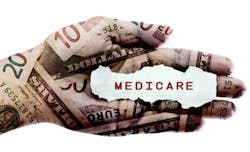At this week’s American Hospital Association (AHA) annual membership meeting, CMS (the Centers for Medicare & Medicaid Services) Administrator Seema Verma asserted that “upside-only” ACOs that do not take on downside risk are not producing good enough results.
Verma delivered a keynote at the Washington, D.C.-based meeting on May 7, where she stated, according to a CMS transcript of the comments, “In addition to developing new models that align with our principles, [HHS Secretary Alex Azar and I] have been reviewing models launched under the prior Administration. We’ve looked at CMS’s accountable care organizations, or ACOs,” Verma said.
More specifically, Verma did note that some ACOs have indeed taken on significant downside risk. “These ‘two-sided ACOs’ have shown significant savings to the Medicare program while advancing quality. And we applaud this success and support the boldness of providers that participate in these models,” she said.
That’s the glass-half-full perspective, however. On the other hand, Verma also remarked in her keynote that “the majority of ACOs, while receiving many waivers of federal rules and requirements, have yet to move to any downside risk. And even more concerning, these ACOs are increasing Medicare spending, and the presence of these ‘upside-only’ tracks may be encouraging consolidation in the market place, reducing competition and choice for our beneficiaries. While we understand that systems need time to adjust, our system cannot afford to continue with models that are not producing results,” Verma said.
When ACOs are in a one-sided risk model, they do not share losses with the government when they overspend past their benchmarks, but they do share in the gains. As such, in these one-sided risk models, CMS is on the hook for the losses all on its own.
To this point, there has been recent analysis of Medicare ACOs—specifically the Medicare Shared Savings Program (MSSP)—that supports Verma’s remarks. A study from Washington, D.C.-based consulting firm Avalere, published in late March, found that downside-risk models in the MSSP model (Tracks 2 and 3) have experienced more positive financial results than upside-only ACOs in this model, indicating the potential for greater savings to CMS over time as the number of downside-risk ACOs increases. Specifically, ACOs in the upside-only model (MSSP Track 1) increased federal spending by $444 million compared to the downside-risk ACOs (MSSP Tracks 2 and 3) that reduced federal spending by $60 million over five years, according to that analysis.
Indeed, as it stands today, MSSP Track 1 remains by far the most popular option for ACOs, representing 82 percent of all MSSP ACOs in 2018. Recently, the National Association of ACOs, the American Medical Association (AMA) and others jointly signed a letter requesting that CMS allow certain ACOs to continue in MSSP Track 1 for a third agreement period before having to move to a two-sided risk model.


